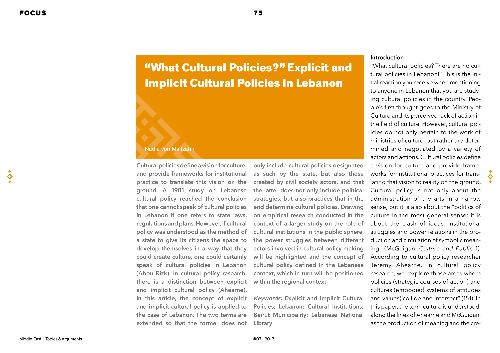“What Cultural Policies?” Explicit and Implicit Cultural Policies in Lebanon
Cultural policies define a vision for culture, and provide frameworks for institutional practice to translate this vision on the ground. A 1981 study on Lebanese cultural policy reached the conclusion that one cannot speak of cultural policies in Lebanon if one refers to state laws, regulations and...
Gespeichert in:
| Veröffentlicht in: | Middle East - Topics & Arguments |
|---|---|
| 1. Verfasser: | |
| Format: | Artikel (Zeitschrift) |
| Sprache: | Englisch |
| Veröffentlicht: |
Philipps-Universität Marburg
2017
|
| Schlagworte: | |
| Online Zugang: | Online Zugang |
| Tags: |
Tag hinzufügen
Keine Tags, Fügen Sie den ersten Tag hinzu!
|
| Zusammenfassung: | Cultural policies define a vision for culture, and provide frameworks for institutional practice to translate this vision on the ground. A 1981 study on Lebanese cultural policy reached the conclusion that one cannot speak of cultural policies in Lebanon if one refers to state laws, regulations and plans. However, if cultural policy was understood as the method of a state to give its citizens the space to develop themselves in a way that they could create culture, one could certainly speak of cultural policies in Lebanon (Abou Rizk). In cultural policy research, there is a distinction between explicit and implicit cultural policy (Ahearne). In this article, the concept of explicit and implicit cultural policy is applied to the case of Lebanon. The two terms are extended so that the former does not only include cultural policies designatedas such by the state, but also those created by civil society actors, and that the latter does not only include political strategies, but also practices that in the end determine cultural policies. Drawing on empirical research conducted in the context of a larger study on the role of cultural institutions in the public sphere, the power struggles between different actors involved in cultural policy making cultural policy defined in the Lebanese context, which in turn will be positioned within the regional context. |
|---|---|
| DOI: | 10.17192/meta.2017.7.5088 |
 Publikationsserver
Publikationsserver